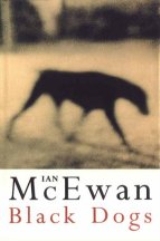
Black Dogs
Encyclopedia
- See the article Black DogBlack dogBlack dog may refer to:* Black dog , a ghostly dog in the folklores of the British Isles* Black dog , a coin in the Caribbean, starting under the reign of Queen Anne* Black Dog , a 1998 film...
for disambiguation.
Black Dogs is a 1992 novel by the Booker Prize-winning British
United Kingdom
The United Kingdom of Great Britain and Northern IrelandIn the United Kingdom and Dependencies, other languages have been officially recognised as legitimate autochthonous languages under the European Charter for Regional or Minority Languages...
author Ian McEwan
Ian McEwan
Ian Russell McEwan CBE, FRSA, FRSL is a British novelist and screenwriter, and one of Britain's most highly regarded writers. In 2008, The Times named him among their list of "The 50 greatest British writers since 1945"....
.
Summary
The novel concerns the aftermath of the NaziNazism
Nazism, the common short form name of National Socialism was the ideology and practice of the Nazi Party and of Nazi Germany...
era in Europe
Europe
Europe is, by convention, one of the world's seven continents. Comprising the westernmost peninsula of Eurasia, Europe is generally 'divided' from Asia to its east by the watershed divides of the Ural and Caucasus Mountains, the Ural River, the Caspian and Black Seas, and the waterways connecting...
, and how the fall of the Berlin Wall
Berlin Wall
The Berlin Wall was a barrier constructed by the German Democratic Republic starting on 13 August 1961, that completely cut off West Berlin from surrounding East Germany and from East Berlin...
in the late 1980s affected those who once saw Communism
Communism
Communism is a social, political and economic ideology that aims at the establishment of a classless, moneyless, revolutionary and stateless socialist society structured upon common ownership of the means of production...
as a way forward for society. The main characters travel to France
France
The French Republic , The French Republic , The French Republic , (commonly known as France , is a unitary semi-presidential republic in Western Europe with several overseas territories and islands located on other continents and in the Indian, Pacific, and Atlantic oceans. Metropolitan France...
, where they encounter disturbing residues of Nazism still at large in the French countryside.
Reception
The novel was well-regarded by critics. In Entertainment WeeklyEntertainment Weekly
Entertainment Weekly is an American magazine, published by the Time division of Time Warner, that covers film, television, music, broadway theatre, books and popular culture...
, writer Gary Giddens said of the book, "Black Dogs is at once characteristic McEwan and a departure...The first half of the novel is a dialogue of ideas, or betrayals, reminiscent of Aldous Huxley's anatomy of marriage, The Genius and the Goddess. June is disgusted with Bernard's belief that science can cure the world's 'wretchedness'; Bernard is embarrassed by June's 'unbounded credulousness,' her eagerness to buy into the bywords of mysticism." He concludes, "McEwan's narratives are small and focused, but resonate far into the night." In The New York Times
The New York Times
The New York Times is an American daily newspaper founded and continuously published in New York City since 1851. The New York Times has won 106 Pulitzer Prizes, the most of any news organization...
, critic Michiko Kakutani
Michiko Kakutani
is an American Pulitzer Prize-winning critic for The New York Times and is considered by many to be a leading literary critic in the United States.-Life and career:...
wrote, "The black dogs that give Ian McEwan's new novel its evocative title come from the name that Winston Churchill once bestowed on his depressions. As used by Mr. McEwan's heroine, however, they signify something larger and more menacing: evil, darkness, irrationality, "civilization's worst moods." They give Mr. McEwan a metaphor by which he can turn a fictional family memoir into an elliptical meditation on Europe's past and future.... The result is an absorbing yet vexing book that is less a conventional novel than a long prose-poemlike mediation on love and faith and history."

